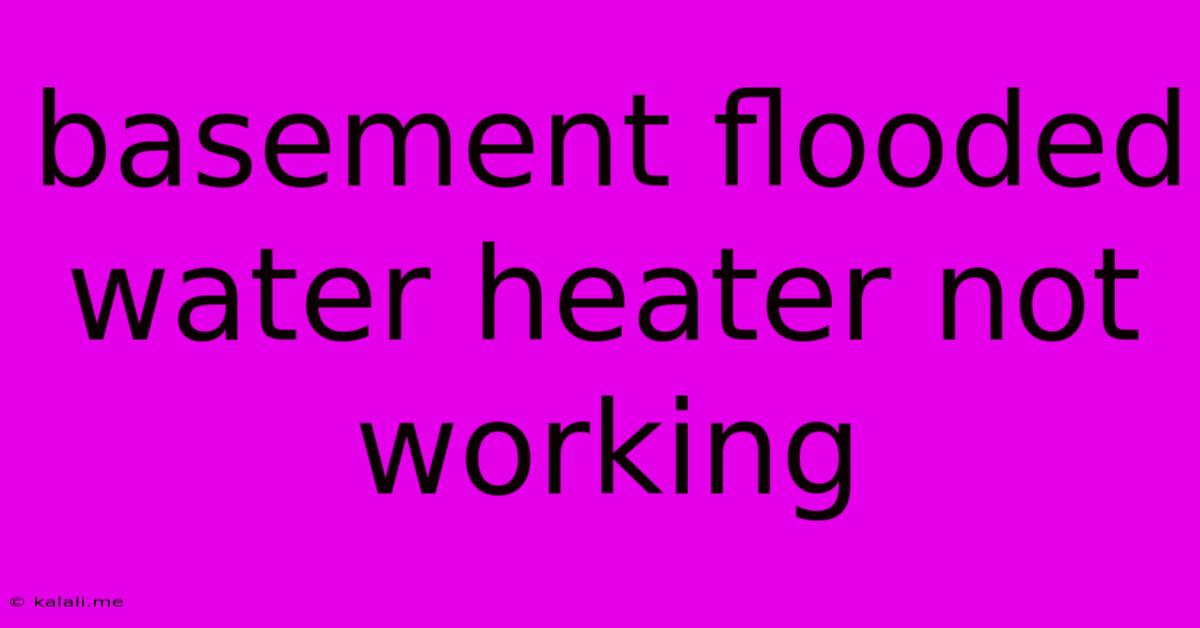Basement Flooded Water Heater Not Working
Kalali
Jun 08, 2025 · 4 min read

Table of Contents
Basement Flooded: My Water Heater's Not Working! What Now?
A flooded basement is a homeowner's nightmare, especially when it involves your water heater. Finding yourself in this situation is stressful, but understanding the potential causes and taking the right steps can minimize damage and get your hot water back on. This article will guide you through troubleshooting the problem and deciding on the best course of action.
Potential Causes of a Malfunctioning Water Heater After a Flood:
A flooded basement can damage your water heater in several ways, leading to its malfunction. The most common causes include:
- Electrical Short Circuit: Water is a conductor of electricity. Floodwater reaching your water heater's electrical components can cause a short circuit, potentially damaging the heating elements, thermostat, or even the entire unit. This is extremely dangerous and should be addressed by a professional immediately. Never attempt to repair electrical components yourself.
- Corrosion: Prolonged exposure to water, especially if it's contaminated, can lead to corrosion of the water heater's tank and internal components. This can cause leaks, reduced efficiency, or complete failure.
- Sediment Buildup: Floodwater can carry debris and sediment into the water heater tank, exacerbating existing sediment buildup and potentially blocking the flow of water or damaging the heating elements.
- Damaged Gas Line (for gas water heaters): Floodwater may have damaged the gas line connected to your water heater. This poses a significant safety risk, leading to gas leaks and potential explosions. Never attempt to inspect or repair a gas line yourself; call a qualified professional immediately.
- Pressure Issues: Sudden changes in water pressure due to flooding can also stress the water heater, potentially leading to leaks or internal damage.
Troubleshooting Steps:
Before calling a plumber or repair technician, it's crucial to assess the situation safely. Always prioritize safety and disconnect the power supply to the water heater before any inspection.
- Check for visible damage: Inspect the water heater for any obvious signs of damage, such as cracks, rust, or leaks. Note the location and extent of any damage.
- Assess the electrical system: Carefully examine the electrical connections and wiring for any signs of water damage or corrosion. Do not touch any wet electrical components.
- Inspect the gas line (if applicable): If you have a gas water heater, check the gas line for any signs of damage or leaks. If you suspect a gas leak, evacuate the premises immediately and call your gas company.
- Check the circuit breaker: Make sure the circuit breaker for the water heater hasn't tripped. If it has, reset it, but only after you've visually inspected the water heater and ensured no electrical hazards remain.
- Check the pilot light (if applicable): If you have a gas water heater, ensure the pilot light is lit. If not, try to relight it following the manufacturer's instructions. If unsuccessful, do not attempt further troubleshooting; call a professional.
What to Do Next:
Depending on the severity of the damage and your assessment, several options are available:
- Minor Issues: If the problem is minor, such as a tripped circuit breaker or a simple sediment buildup, you might be able to resolve it yourself (after ensuring electrical safety). However, if unsure, professional help is always advisable.
- Major Damage: If you find significant damage, leaks, or suspect electrical or gas issues, immediately call a qualified plumber or appliance repair technician. Repairing a damaged water heater can be complex and dangerous, and attempting to do it yourself could worsen the situation.
- Water Heater Replacement: Severe damage might necessitate replacing the water heater entirely. A professional can assess the damage and advise you on the best course of action.
Preventing Future Flooding Damage:
Consider these preventative measures to protect your water heater from future flooding:
- Install a sump pump: A sump pump can help remove excess water from your basement, preventing future flooding.
- Elevate your water heater: Raising your water heater off the basement floor can help prevent damage from minor flooding.
- Install water sensors: Water sensors can alert you to leaks or flooding, allowing you to address the problem quickly.
Dealing with a flooded basement and a malfunctioning water heater requires careful assessment and prompt action. Prioritize safety, call in professionals when necessary, and take preventative measures to protect your home and appliances in the future.
Latest Posts
Latest Posts
-
I Need An Impact Drive Head
Jun 08, 2025
-
Are Find The Value And Solve For X The Same
Jun 08, 2025
-
Do Women In India Wear Head Coverings
Jun 08, 2025
-
Open The Current Folder In Terminal In Nnn
Jun 08, 2025
-
Sims 2 Edit Family In Cas
Jun 08, 2025
Related Post
Thank you for visiting our website which covers about Basement Flooded Water Heater Not Working . We hope the information provided has been useful to you. Feel free to contact us if you have any questions or need further assistance. See you next time and don't miss to bookmark.